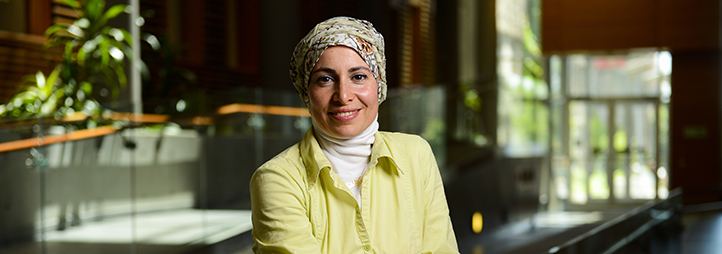By Leah Coppella
Nadia Abu-Zahra, the new Joint Chair in Women’s Studies at Carleton University and the University of Ottawa, says she’s intent on promoting communities of practice where people are free to share experiences and common interests in learning and transforming together.
Abu-Zahra is an associate professor in the School of International Development and Global Studies at the University of Ottawa and a member of the Human Rights Research and Education Centre.

Prof. Nadia Abu-Zahra
She completed a doctorate in Geography at the University of Oxford while working as a Research Fellow at the Refugee Studies Centre.
Her book, Unfree in Palestine: Registration, Documentation and Movement Restriction, co-authored with Adah Kay, tells the stories of Palestinians who have become denationalized through bureaucratic means like blacklisting.
“I’ve never not had an emotional connection what I do,” she says.
Building Communities, Creating Mobilization
Abu-Zahra’s expertise in migration, identity documentation and population control, especially in Palestine and the Middle East, sparked the “Community Mobilization in Crisis” project providing people with the open material and educational resources to create mobilizations. It connects with community mobilizers around the world and provides interviews in multiple languages.
“We are working with people involved in mobilization from Lebanon to Brazil,” she says. “The resources can be used transnationally in order to strengthen communities across the world.”
Abu-Zahra and her team record a video interview with individual mobilizers, then use the footage to highlight their successes, failures and struggles as a potential resource for teachers and students. They include questions for the audience, such as: What do you value in mobilization? Or what strategy would you take?
“Community Mobilization in Crisis” has 27 units so far, but Abu-Zahra says there are plans to produce many more.
As the Joint Chair in Women’s Studies, Abu-Zahra is engaging with students, staff and faculty, as well as feminist organizations and educators at multiple levels. She will also teach seminars, work within collaborative research projects, and organize events to create conversation around feminist teachings.
Focusing on Inclusion
Ultimately, Abu-Zahra says she wants to make space for a community at Carleton that is inclusive and free.
“I want it to be what people want to make of it,” she says. “I am prepared to fully provide resources, but I also want to have the open dialogue about how to use them and what people really want to see in the community.”
Abu-Zahra highlights that collective decision-making will be a crucial aspect of her work here.
“What I’m hoping to do is provide optimistic spaces for people where they are happy with decisions that we all make together.”
But she stresses her biggest goal for her time at Carleton is to build communities of practice, which consists of trust, a common purpose and shared knowledge among students, staff and faculty.
“Transformational work happens in small safe spaces. And you need to feel supported to be able to do that,” Abu-Zahra says. “I hope to provide that at Carleton.”
Wednesday, November 20, 2019 in Faculty of Arts and Social Sciences, Women's Studies
Share: Twitter, Facebook



